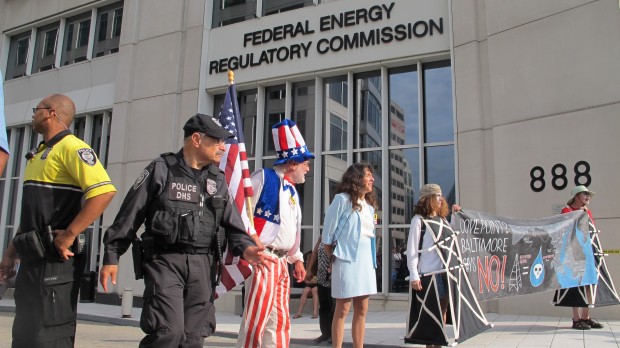Federal court dismisses suit charging FERC with bias

Marie Cusick / StateImpact Pennsylvania
Pipeline opponents stage a protest outside the Washington D.C. headquarters of the Federal Energy Regulatory Commission in July, 2014.
This story has been updated with a comment from the PennEast Pipeline company.
A federal court has thrown out a case brought by environmentalists that charged the Federal Energy Regulatory Commission with bias in pipeline cases. The Delaware Riverkeeper Network filed a federal lawsuit last year, alleging FERC favored industry in disputed pipeline cases. On Wednesday, District Court Judge Tanya Chutkan ruled that while DRN had standing to bring the suit, she dismissed the claim that FERC is structurally biased based on its source of funding.
The lawsuit, brought by the Delaware Riverkeeper Network and its director, Maya van Rossum, asserted that FERC is incapable of making objective decisions regarding pipeline projects because its funding, set by Congress, is recovered by fees imposed on the industries it regulates, including pipeline companies. DRN argued that “the Commission is insulated from Congressional budgetary oversight,” and therefore, deprives individuals opposed to new pipelines of their 5th amendment right to due process.
But Judge Chutkan rejected that argument, saying that FERC itself and its commissioners do not benefit from individual pipeline projects.
“FERC stands to gain no direct benefit from the approval of a particular pipeline project. If FERC does not approve any one project, its budget remains the same, with the proportional volumetric charge per gas company being slightly higher. If FERC commissioners also had ownership interests in gas companies, they might individually have a financial stake in granting certificates because it would reduce the proportional charges on their own companies.”
Chutkan also wrote that “the connection between the act of approving an individual pipeline and the financial sustainability of the Commission as a whole is simply too remote to create any such bias.”
Because the court dismissed the structural argument on bias, it did not rule on the arguments of actual bias alleged by the Riverkeeper. DRN says FERC approves all pipeline projects that come before it, fails to enforce terms and conditions of its certificates, issues “tolling orders” that allow construction of pipelines despite appeals of the agency’s decisions, has not ever conducted a full Environmental Impact Statement, and allows its “Office of Public Participation” to remain unfunded. The lawsuit also alleged actual bias from the make-up of the commission itself, which draws its members from the industries FERC has a duty to oversee, in essence creating a “revolving door.”
Maya van Rossum, who along with the Delaware Riverkeeper Network brought the suit, says she’s happy the court ruled in their favor regarding standing, but says FERC remains an agency that goes about its business with no oversight.
“There is no watch-dog willing to bring this out-of-control agency in check,” said van Rossum.”That’s the most disappointing piece, every branch of government, the executive, the legislative and now the judiciary is not willing to stand up to FERC in order to protect the environment.”
PennEast Pipeline Company, which is planning to build a 120-mile long natural gas pipeline from Northeast Pennsylvania, beneath the Delaware River and into New Jersey, applauded the decision. PennEast was an intervenor in the case. PennEast spokeswoman Pat Kornick called the Delaware Riverkeeper Network a “fringe group.”
“The Delaware Riverkeeper Network is an organization that stops at nothing to spread misinformation, scare the public and file ridiculous lawsuits, as validated by a federal court judge who dismissed the lawsuit that was filed last year,” said Kornick. “This is the latest example of opposition groups wasting time, tax dollars and government resources with baseless claims and ridiculous lawsuits.”
















